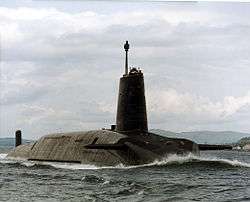Letters of last resort

The letters of last resort are four identically-worded handwritten letters from the Prime Minister of the United Kingdom to the commanding officers of the four British ballistic missile submarines. They contain orders on what action to take in the event that an enemy nuclear strike has destroyed the British government and has killed or otherwise incapacitated both the Prime Minister and the "second person" (normally a high-ranking member of the Cabinet) whom the Prime Minister has designated to make a decision on how to act in the event of the Prime Minister's death. In the event that the orders were to be carried out, the action taken could be the last official act of Her Majesty's Government.[2]
The letters are stored inside two safes in the control room of each submarine.[3] The letters are destroyed unopened after a Prime Minister leaves office, so their content remains known only to them.[4]
Process
The letters are written as soon as a new Prime Minister takes office, after being told by the Chief of the Defence Staff "precisely what damage a Trident missile could cause".[5] These are then delivered to the submarines, with the previous Prime Minister's letters being destroyed without being opened.[6]
In the event of the death of both the Prime Minister and the designated alternative decision-maker as a result of a nuclear strike, the commander(s) of the nuclear submarine(s) (at any time at least one is on patrol) will use a series of checks to ascertain whether the letters of last resort will have to be opened.[7]
According to Peter Hennessy's book The Secret State: Whitehall and the Cold War, 1945 to 1970, the process by which a Vanguard-class submarine commander would determine if the British government continues to function includes, amongst other checks, establishing whether BBC Radio 4 continues broadcasting.[8]
In 1983, the procedure for Polaris submarines was to open the envelopes if there was an evident nuclear attack, or if all UK naval broadcasts had ceased for four hours.[9]
Options
While the contents of these letters are secret, according to the December 2008 BBC Radio 4 documentary The Human Button, there were four known options given to the Prime Minister to include in the letters. The Prime Minister instructs the submarine commander to:
- retaliate with nuclear weapons;
- not retaliate;
- use his own judgement; or
- place the submarine under an allied country's command, if possible. The documentary mentions Australia and the United States.
The Guardian reported in 2016 that the options are said to include: "Put yourself under the command of the US, if it is still there", "Go to Australia", "Retaliate", or "Use your own judgement".[5]
Fiction
David Greig's 2012 play The Letter of Last Resort deals with the consequences and paradoxes of the letters. It was dramatised for BBC Radio 4, directed by Nicolas Kent and first broadcast on 1 June 2013.[10]
See also
- Operation Looking Glass
- Dead Hand (nuclear war)
- Mutually assured destruction
- Vanguard-class submarine
References
- ↑ "Brown move to cut UK nuclear subs". BBC News. 23 September 2009. Retrieved 24 January 2011.
- ↑ Taylor, Adam (13 July 2016). "Every new British prime minister pens a handwritten 'letter of last resort' outlining nuclear retaliation". Washington Post. Retrieved 13 July 2016.
- ↑ Rosenbaum, Ron (January 2009). "The Letter of Last Resort". Slate Magazine. Retrieved 18 May 2009.
In the control room of the sub, the Daily Mail reports, "there is a safe attached to a control room floor. Inside that, there is an inner safe. And inside that sits a letter. It is addressed to the submarine commander and it is from the Prime Minister.
- ↑ Rosenbaum, Ron (January 2009). "The Letter of Last Resort". Slate Magazine. Retrieved 18 March 2012.
[E]very prime minister in recent years has written such a letter and ... letters that go unused (Tony Blair's for instance) are destroyed without being read.
- 1 2 Norton-Taylor, Richard (11 July 2016). "Theresa May's first job: decide on UK's nuclear response". the Guardian. Retrieved 13 July 2016.
- ↑ Bunkall, Alistair (13 July 2016). "May To Be Handed Keys To Nuclear Red Button". Sky News. Retrieved 13 July 2016.
- ↑ "Theresa May's grim first task: Preparing for nuclear armageddon". Politico. 15 July 2016. Retrieved 15 July 2016.
- ↑ "HMS Apocalypse: Deep in the Atlantic, a submarine waits on alert with nuclear missiles that would end the world...". Daily Mail. London. Retrieved 10 May 2012.
- ↑ Goodall, David (26 May 1983), Arrangements for briefing a new Prime Minister in the event of a change of administration following the 1983 General Election (PDF), TNA) (published 1 August 2013), CAB 196/124, retrieved 5 September 2013
- ↑ "Saturday Drama, The Last Resort". BBC Radio 4 website. 1 June 2013. Retrieved 1 June 2013.
External links
- Hennessy, Peter; Knight, Richard (30 November 2008). "HMAS Apocalypse: Deep in the Atlantic, a submarine waits on alert with nuclear missiles that would end the world...". Daily Mail. Retrieved 10 February 2015.
- "The Human Button". BBC Radio 4. 2 December 2008. Retrieved 10 February 2015.
- Rosenbaum, Ron (9 January 2009). "The Letter of Last Resort". Slate. Retrieved 10 February 2015.
- Radio archive: Glass, Ira (22 January 2010). "399: Contents Unknown (Prologue)". This American Life. Retrieved 10 February 2015.